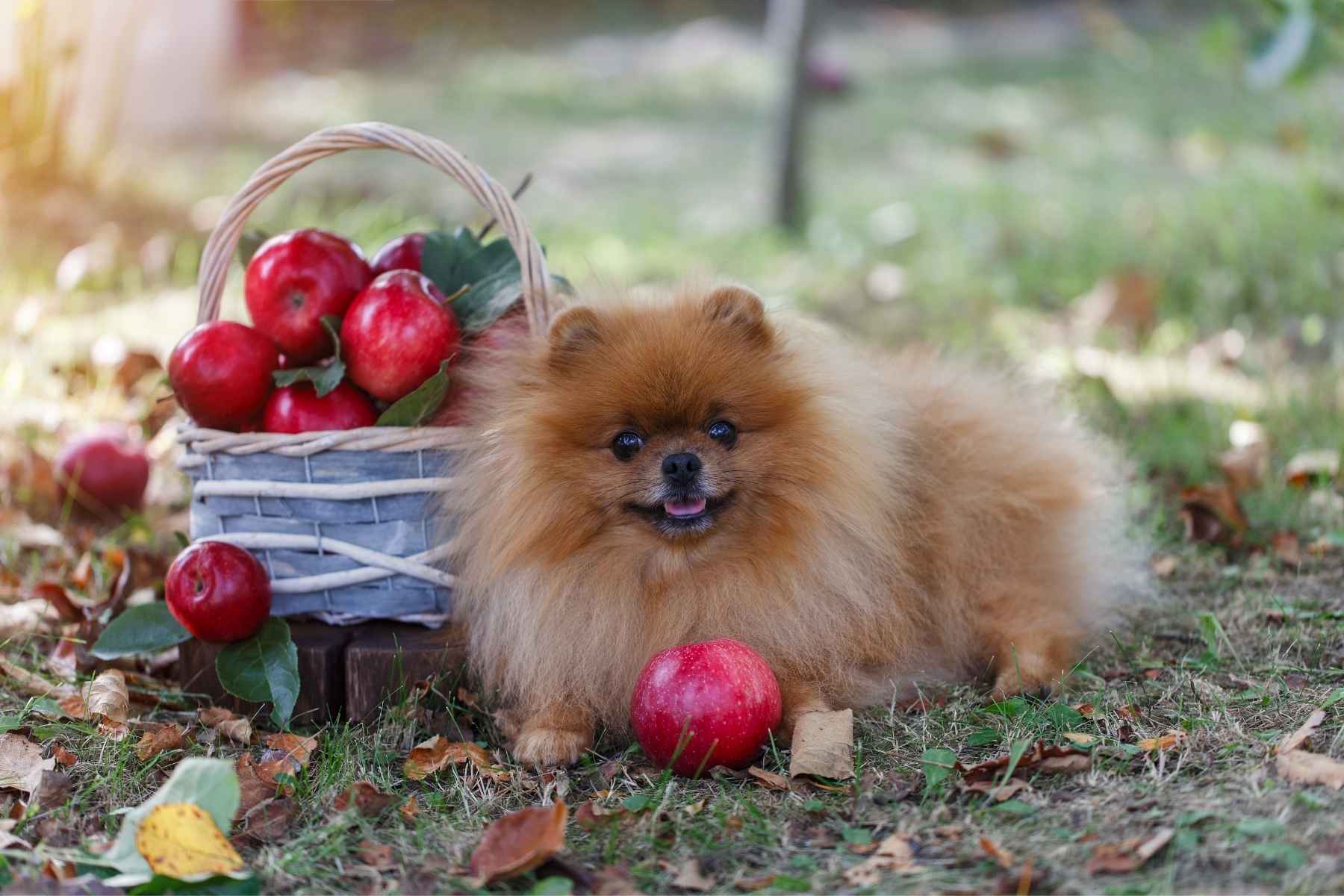Can Dogs Eat Apples?

Yes, dogs can eat apples! In fact, they are a healthy and low-calorie treat for dogs. Apples contain antioxidants, dietary fiber, vitamin A, and vitamin C. Apple peels are a good source of fiber and help ease digestion for dogs with sensitive stomachs.
Fruits like apples may cause some stomach problems in dogs that are not used to them. You’ll want to exercise caution when giving your dog a whole apple as they might accidentally swallow the core and seeds (which can be harmful). Health experts say that apples are a superfood for dogs.
What are the benefits of feeding apples to dogs?
There are many benefits to feeding apples to dogs. Apples are a good source of fiber, Vitamin C and antioxidants, which can help keep dogs healthy. Apples can also help dogs lose weight or maintain a healthy weight, and can help improve their digestion.
Dogs love to snack on apples, and for good reason – they are a nutritious and healthy food. Apples provide essential vitamins, minerals, and fiber for dogs, as well as antioxidants that support the immune system.
The water content of an apple is about 85%, making it a great source of hydration for your dog. Additionally, the prebiotic effect of apples may help support your dog’s gastrointestinal health.
What are the side effects of feeding apples to dogs?
When feeding apples to dogs, it is important to be aware of the side effects. While most dogs can eat apples without any problems, some may experience gastrointestinal issues or even cyanide poisoning (if they eat the core and seeds). Additionally, feeding your dog too many sugary snacks like apples can lead to weight gain and other health problems.
While it is generally safe to give your dog apples, you should avoid giving them sugary snacks like apples if the dog is overweight. Additionally, a dog should only consume 10% of its daily caloric intake from treats. This will help keep the dog healthy and prevent obesity.
How many apples can a dog eat in a day?
It’s important to remember that while apples are a healthy snack for dogs, they should not make up the majority of their diet. A good rule of thumb is to only give them one or two small apples per day as a treat. Anything more than that could potentially upset their stomach or cause weight gain.
Additionally, you should avoid feeding diabetic dogs large quantities of apples as they contain sugar which can negatively impact blood glucose levels.
Pre-sliced and cored apples can be given to dogs in case they want to eat the fruit skin too, but make sure no seeds are swallowed. As always, it’s important to monitor your dog when giving them any new treats in order to ensure they don’t experience any adverse effects.
What type of apples can be fed to dogs?
All edible apple varieties are safe for dogs to eat, but they may not enjoy all of them equally.
Dogs prefer sweeter fruits, like the goldens or reds like Fuji, Gala, and Honeycrisp or green or more tart varieties like Gravenstein and Granny Smith apples. Organic apples have pesticides to avoid as much as possible; non-organic apples may be sprayed with pesticides during cultivation.
Avoid products that contain apples because they often have chemicals, artificial flavors, added sugars, and xylitol. Avoid apple-flavored products or foods made from apples.
All apples are good for your dog to eat as a treat. Tart flavors aren’t a turn-off to your dog – some varieties of apples are better than others according to taste preferences.
Dogs and apples FAQ
Can dogs eat apples with skin?
Dogs can eat apples with the skin still attached. The skin of the apple is a good source of fiber, which is beneficial for dogs. However, the core and seeds of the apple contain cyanide, which is poisonous to dogs.
You should always wash unpeeled fruits before giving them to your dog, just as you would for yourself.
Can dogs eat apple seeds?
It’s important to remember that apple seeds contain cyanide, which is poisonous to both dogs and humans. So while it’s okay for your dog to eat a few apple seeds every now and then, you should never give them a diet consisting solely of apple seeds. Additionally, you should always supervise your dog when they’re eating any type of food, just in case they try to eat something they’re not supposed to.
Cyanide levels are relatively low and won’t pose significant danger after a single apple.
Can dogs eat apple cores?
If your dog eats an apple core, it’s not a big deal. However, if he starts to choke on it, you may need to intervene. If he swallows the core before you can remove it, keep an eye on him and make sure he doesn’t choke.
If he does start choking, look for signs that he’s trying to paw at his mouth and remove the core as quickly as possible.
Can dogs eat raw apples?
Apples are a good source of fiber, Vitamin C and antioxidants for dogs. However, dogs should not eat the core or seeds of apples because they contain harmful toxins. Raw apples are a healthy snack for dogs, but should be limited to no more than one or two per day to avoid stomach upset.
Do apples make dogs fart?
Dogs are not able to break down the cellulose in apples as humans can. The fermentation of the apple in the dog’s gut then produces gas, which causes the dog to fart.
Can dogs eat applesauce?
Dogs can safely eat small portions of applesauce, but there may be difficult to find one that is good for them. Always choose unsweetened applesauce — avoid the added sugars!
Applesauce can be used in homemade treats for dogs and can even be made at home to avoid any unwanted sugar content.
Can dogs eat apples with peanut butter?
Apples are safe for dogs to eat, but they may cause gastrointestinal problems like diarrhea and vomiting if your dog eats too many.
Peanut butter is also safe for dogs to eat, but it contains high levels of fat and salt that can upset a dog’s stomach.
If your dog does eat apples with peanut butter, make sure to monitor them for any signs of gastrointestinal distress.
Can dogs have apple butter?
Apple butter is high in sugar and low in protein, so it can make dogs feel sick if they eat too much. Dogs also shouldn’t eat the cores or seeds of apples, because those parts contain a small amount of harmful toxins such as cyanide.






